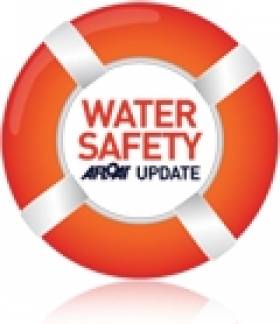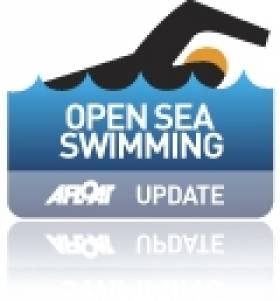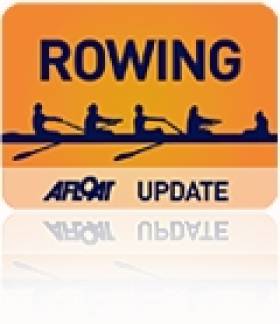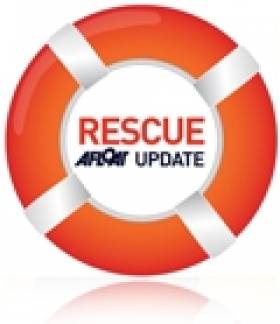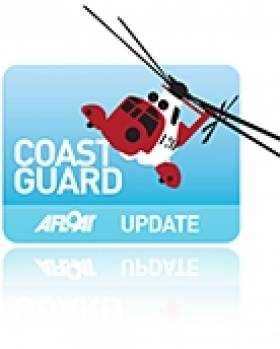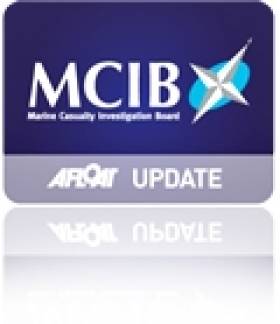Displaying items by tag: hypothermia
Christmas Swim Water Safety Advice
#watersafety – Irish Water Safety is appealing to the public to take extreme care when taking part in sponsored swims. Participants can be distracted by the occasion and take chances beyond what is acceptably safe and can be left without sufficient strength to climb out of the water due to the cold. Cold winter waters can cause "cold shock" and hypothermia can set in within minutes, overwhelming the fittest of swimmers.
People organising Christmas swims should ensure that they provide comprehensive details of each event to the Irish Coast Guard and local Gardai.
Each event should have a Safety Officer appointed, who will advise those concerned on safety and have the ultimate responsibility for making decisions in relation to the swim being on or off on the day on the day dependent on weather and tidal conditions remembering that there is a new moon on the 22nd of December so there will be spring tides leading to strong tidal streams on Christmas day.
If the seas are rough and weather deteriorates, they should defer the event to a more suitable day without question and not take a chance on running the event.
Many participants will not have swum since the summer and the temperature of the water has now dropped from approximately 17°C to 10°C, therefore we advise inexperienced swimmers to wear a wetsuit.
It is a fallacy that alcohol will keep you warm when entering the water; in fact it has the reverse effect and could kill you. Irish Water Safety strongly recommends that no alcohol be taken either before the swim or after the swim and also remind people that they may be in breach of the drink driving laws when driving to or from the event.
Cold water can cause cold shock and hypothermia in minutes, because the temperature of the water at this time of year will be below 10°C. Christmas day charity swimmers occasionally remain too long in the water in a gesture of bravado and can find themselves left without sufficient strength to climb out of the water becoming unbalanced and disoriented due to them becoming hypothermic, two or three minutes is plenty of time in the water for the inexperienced. Remember shivering and teeth chattering are the first signs of Hypothermia.
Ensure that you have safe access and egress with appropriate shallow shelving or ladders as appropriate. People should be mindful that steps leading into the water might be dangerous due to the growth of algae..
Swimmers' remaining in the water for extended periods in a gesture of bravado is not acceptable. The message is "Get In, Get Out and Warm Up" and in the event of an emergency call the Coast Guard on 112.
Hypothermia Ends Open Sea Swim from Ireland to Wales
#openseaswim – The attempt by well known open water swimmer Steve Redmond to swim from Ireland to Wales ended in the early hours of Thursday morning (22 August) on the advice of his support team, which included medical personnel, after he showed signs of hypothermia just hours into the swim. He had left Carne Pier in Wexford earlier and was bound for St. Davids in Wales.
Steve has already made history for being the first man ever to complete the gruelling Seven Oceans Swim and was looking to take on the challenge of being the first person to swim from Ireland to Wales. He was also raising funds for the RNLI.
Speaking on the decision to end the swim John Kearney from Steve's support team said, "While I know many people will be disappointed, not least Steve himself, we made the right decision to end the attempt. Our main focus and concern was always Steve's health and when he started displaying worrying signs of hypothermia we felt that with such a long swim ahead of him it was not worth the risk. Steve has swam some of the most gruelling oceans and he knows that everything has to be right and you don't take chances.
I want to thank everyone for their support for Steve and this swim. It would have been an amazing accomplishment to add his incredible collection of endurance swims."
Rowers Rescued After Fisa Tour Hit by Squall on Shannon
# ROWING RESCUE: The Fisa Rowing Tour on the Shannon has been suspended a day before the scheduled finish after a number of boats were swamped during a squall on Lough Derg. Fourteen boats, which take a crew of five, were on the water at the time. All the rowers were accounted for and though some rowers were treated for hypothermia, none needed to go to hospital.
The full number on the tour, which is popular with retired people, was 101, but 31 had either taken the day off or were cycling alongside the Shannon.
The organisers were surprised to hear reports that 18 boats were “capsized” and that rowers did not have life jackets. “All rowers were wearing lifejackets or had access to them,” one of the main support personnel said. For a time one boat was thought to be missing, but the rowers were on land.
#MCIB - The families of two fishermen found dead at sea off the Skerries last April may never uncover the circumstances that led to their demise. But the official report into the incident indicated that the absence of lifejackets was a significant contributing factor.
Ronan Browne (26) and David Gilsenan (41) were reported missing on the evening of 1 April after failing to return from a trip tending to lobster pots.
Their vessel, Lady Linda, was found the following morning upturned in an oil slick off Clogherhead with no sign of the crew.
It wasn't until a week later that their bodies were discovered caught in the vessel's fishing gear some five miles east of Clogherhead, as previously reported on Afloat.ie.
Post-mortem results found that both men died from drowning, with Gilsenan also showing signs of hypothermia.
With no eyewitnesses to the incident, the report by the Marine Casualty Investigation Board (MCIB) indicated a number of possible causes from eqiupment malfunction or shifting of lobster pots on deck, to the wave height and weather conditions on the day, which were reportedly deteriorating when the boat left port.
It also said that Browne and Gilsenan "were lifelong friends, both men were experienced and qualified marine engineers in the fishing vessel industry. Both men were experienced in boat handling and fishing and had worked together on many occasions."
But the report emphasised the lack of personal flotation devices (PFDs) on board, and noted that emergency equipment was stored under the deck and not easily accessible.
The MCIB's recommendations include a review of the code of practice for fishing vessels under 15m to establish "revised stability critera" and ensuring that all boats are fitted with automatic radio beacons that deploy upon capsize.
In a separate incident, lack of proper maintenance led to an unlicenced boat taking on water off Co Kerry last August.
The Claire Buoyant was carrying one crew, five passengers and 21 sheep from Beginish Island to Ventry when the vessel began to lose stability.
Skipper Eoin Firtear - who the MCIB described as having "limited sea-going experience" - and his five passengers were rescued by passenger ferry. All sheep were jettisoned overboard, with 18 eventually recovered.
The report reminded that the carriage of livestock should only be undertaken in appropriately certified vessels.
- MCIB
- Marine Casualty Investigation Board
- report
- Lady Linda
- Clogherhead
- Ronan Browne
- David Gilsenan
- lobster pots
- Fishing
- drowning
- hypothermia
- missing
- malfunction
- wave height
- Weather
- lifejackets
- Personal Flotation Devices
- PFDs
- Code of Practice
- stability
- Radio
- beacon
- maintenance
- unlicenced
- Co Kerry
- Claire Buoyant
- Sheep
- Passengers
- Beginish Island
- Ventry
- Eoin Firtear
- Skipper
- Rescue
- Livestock
Children Rescued From Co Down Waters
Four teenagers were rescued in Co Down last weekend when they were cut off by the tide, the News Letter reports.
The teens were caught up to their shoulders in water at Ardilea on Saturday evening when they were retrieved by a former volunteer coastguard who lives nearby.
The group were met at the shore by the South Down Coastguard Rescue Team and NI Ambulance Service paramedics and taken to hospital showing signs of hypothermia.
Meanwhile, on Friday night RNLI Bangor lifeboat rescued a young girl stranded on a rock near Groomsport after a call from a member of the public.
“With waves breaking around the knees of the frightened child it was paramount that she be brought ashore as quickly as possible," said a coastguard statement.
The girl was treated by waiting paramedics at the shore.
Four Teenagers Rescued in Dundrum Bay
Belfast Coastguard immediately tasked Southdown Coastguard Rescue Team and requested the launch of the Newcastle RNLI Inshore Lifeboat. Northern Ireland Ambulance Service also responded to the incident.
Whilst search and rescue units were proceeding to the incident, a gentleman who has formally served as a volunteer Coastguard and lives nearby assisted in the rescue. He managed to get his dinghy into the water and get to the teenagers who were showing signs of hypothermia and were complaining of the cold.
After recovering all four teenagers with his dinghy, he made shore to be met by members of Southdown Coastguard Rescue Team and NI Ambulance Service paramedics. The four were transported to hospital by two ambulances for further assessment.
Gary Young, Watch manager, Belfast Coastguard said:
These teenagers are extremely lucky to have been rescued this evening. I would like to pay tribute to the quick thinking of a former Coastguard who's actions certainly made for a happy ending to this potentially life threatening incident. Southdown CRT also showed their professionalism throughout this incident which was co-ordinated by MRCC Belfast.
We would like to remind anyone visiting the coast to take great care near water. Do not put yourselves at risk and if you find yourselves in trouble, dial 999 and ask for the Coastguard.
The report by the Marine Casualty Investigation Board (MCIB) into the loss of a kayaker in Castletownshend last year has found the death was caused by hypothermia and heart failure due to a pre-existing condition.
Didier Heneault, 56, died while kayaking with his wife Margaret near Horse Island, after his kayak overturned in choppy water.
The French couple, who were experienced kayakers, had set off from the League near Raheen Town in Co Cork on the morning of 30 May 2010, paddling south-east.
On the western side of Horse Island, Mrs Heneault turned and saw that her husband was in thw water about 10m from his kayak. She tried to assist him in climbing out of the water back into the kayak but was unsuccessful.
Mrs Heneault used a safety rope to keep her husband afloat, but after 10 minutes he became unresponsive.
Some hours later passing kayakers heard Mrs Heneault's calls for help and assisted in towing the couple back to shore at Horse Island, where they gave Mr Heneault CPR. They were joined shortly after by the Baltimore Inshore Lifeboat and the Toe Head coastguard unit.
Mr Heneault was transferred to a waiting ambulance at Castletownshend pier where he was treated by paramedics before being taken to Cork University Hospital. There he was pronounced dead at 4.50pm.
The report into the incident by the MCIB said the post-mortem gave the cause of death as cardiac failure due to hypertensive cardiomyopathy following immersion in cold water and associated hypothermia, with a medical history of hypertension.
The report also recommended that lifejackets should be used instead of buoyancy aids when offsore kayaking, where the risk of capsizing is greater. A lifejacket of 150 Newtons or more would have kept Mr Heneault's head above water at all times, it said.


























